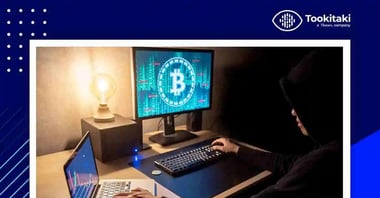Some of the biggest cryptocurrency exchanges in the world are under federal investigation for allegedly breaking American sanctions by enabling users to buy and sell digital tokens in Iran and other countries.
Kraken, a San Francisco-based cryptocurrency exchange, has reportedly been subject to a Treasury Department investigation since 2019.
Federal authorities are reportedly looking into cryptocurrency exchange Kraken for allegedly enabling users in Iran to trade digital assets defying US sanctions.
According to the New York Times (NYT), which cited five sources familiar with the situation, the exchange has been the subject of an investigation by the Office of Foreign Assets Control (OFAC) of the Treasury Department since 2019 and may be fined. Kraken would be the largest US. Crypto firm to face enforcement action from OFAC. Regulatory measures have already been taken against Kraken. The CFTC fined the company $1.25 million last year for providing an illegal trading service.
For more than three decades, US policy has frequently included sanctions against Iran. After pulling out of the Iran nuclear agreement in 2018, former president Donald Trump reinstated sanctions. In his view, the deal did not do enough to rein in Iran's missile development. Due to these restrictions, US companies having trade ties to Iran had to cease operations.
Kraken's chief legal officer, Marco Santori, stated that the San Francisco-based cryptocurrency exchange does not comment on particular conversations with regulators and is growing its compliance staff to keep up with the expansion of its business. Separately, due to Russia's conflict with Ukraine, the US has placed sanctions on several Russian individuals. However, no statutory restriction prevents crypto providers from barring access to accounts. According to Kraken CEO Jesse Powell, total bans would be unfair to Russians, calling such a move a "pretty extreme measure."
Other Companies Facing Charges for Servicing Sanctioned Nations
As the market for digital currencies has expanded, the federal government has aggressively cracked down on crypto businesses, which are only loosely regulated. In July, the Justice Department filed insider trading charges against an ex-employee of Coinbase, one of the biggest US crypto exchanges. Tether, a stablecoin startup, was fined by the Commodity Futures Trading Commission for false representations of its reserves last year.
A macroeconomic environment that is unpredictable, a decline in risk appetite following the collapse of TerraUSD (UST), and the ripple effects on cryptocurrency lenders like Celsius and Voyager are some of the contributing factors. Industry analysts anticipate that the regulatory environment for cryptocurrencies will rapidly change. This month, according to a report from Reuters, Binance broke US restrictions by letting users from Iran to trade on its platform. However, according to Chagri Poyraz, Binance's global head of sanctions (VPNs), users may have been able to get around restrictions via Virtual Private Networks.
Although not for disobeying US sanctions, Kraken has already faced enforcement actions and was apparently seeking a valuation exceeding $10 billion earlier this year. The Commodity Futures Trading Commission fined the exchange $1.25 million in September 2021 for allegedly making an improper offering.
BitGo, a provider of digital wallet services located in Palo Alto, California, was fined more than $98,000 by the OFAC in 2020 for 183 alleged sanctions violations. For 2,102 alleged infractions, it penalised BitPay, an Atlanta-based cryptocurrency payment processor, more than $500,000 last year. Coinbase also disclosed in a 2021 financial filing that it had sent notices to OFAC flagging transactions that may have violated sanctions, though the agency hasn't taken any enforcement action.
Learn More: Latest AML Fine Figures
How to Remain Compliant According to OFAC
According to Hailey Lennon, an attorney at Anderson Kill who specialises in regulatory concerns in the cryptocurrency industry, "the fact that crypto can move without a bank or middleman means that exchanges are accountable for some sorts of financial regulatory compliance."
In a guide published by OFAC, they list their expectations for internal controls from any virtual currency firms.
OFAC states that an effective sanctions compliance programme will include policies and procedures designed to address the risks identified in a company's risk assessment. These may include controls to identify, interdict, escalate, report (as appropriate), and maintain records for transactions or activities prohibited by OFAC-administered sanctions. An effective sanctions compliance programme will enable a company to conduct sufficient due diligence on customers, business partners, and transactions and identify "red flags."
Red flags are indications that illicit activity or compliance breakdowns may be occurring that prompt a company to investigate and take appropriate action. Policies and procedures should be enforced, and weaknesses should be identified and remediated to prevent activity that might violate sanctions. In the virtual currency industry, the internal controls a company implements will depend on the products and services the company offers, where the company operates, the locations of its users, and what sanctions-specific risks the company identifies during its risk assessment process. Internal controls often involve the use of industry-specific tools, such as screening, investigation, and transaction monitoring.
OFAC also states that the virtual currency industry may use software as these can be helpful tools for an effective sanctions compliance programme.
Risk Indicators or Red Flags According to OFAC
In their guide, OFAC states that in addition to screening transactions and other KYC identifying information, virtual currency companies should also consider monitoring transactions and users for risk indicators or "red flags" that may indicate a sanctions nexus. Examples of risk indicators may be individuals or entities who:
- Provide inaccurate or incomplete customer identification or KYC information when attempting to open an account
- Attempt to access a virtual currency exchange from an IP address or VPN connected to a sanctioned jurisdiction
- Are non-responsive or refuse to provide updated customer identification or KYC information
- Are non-responsive or refuse to provide additional transaction information in response to a virtual currency company's request
- Attempt to transact with a virtual currency address associated with a blocked person or sanctioned jurisdiction
Additionally, as appropriate, "red flags" indicative of money laundering or other illicit financial activity may also be indicative of potential sanctions evasion.
The Need For a Sanctions Screening Tool
As a corporation, you have the difficulty of finding a way to thoroughly and cost-effectively review the numerous sanctions lists without disturbing your daily operations. Manual checks would be complex and time-consuming due to a large number of sanctions lists to be verified and can also easily lead to human error. Finding an automated system to complete these mandatory tests makes sense and is the simplest way to reach the compliance standards that regulators like OFAC require.
Speak to a team member to get more information about our screening tool today.
Anti-Financial Crime Compliance with Tookitaki?



